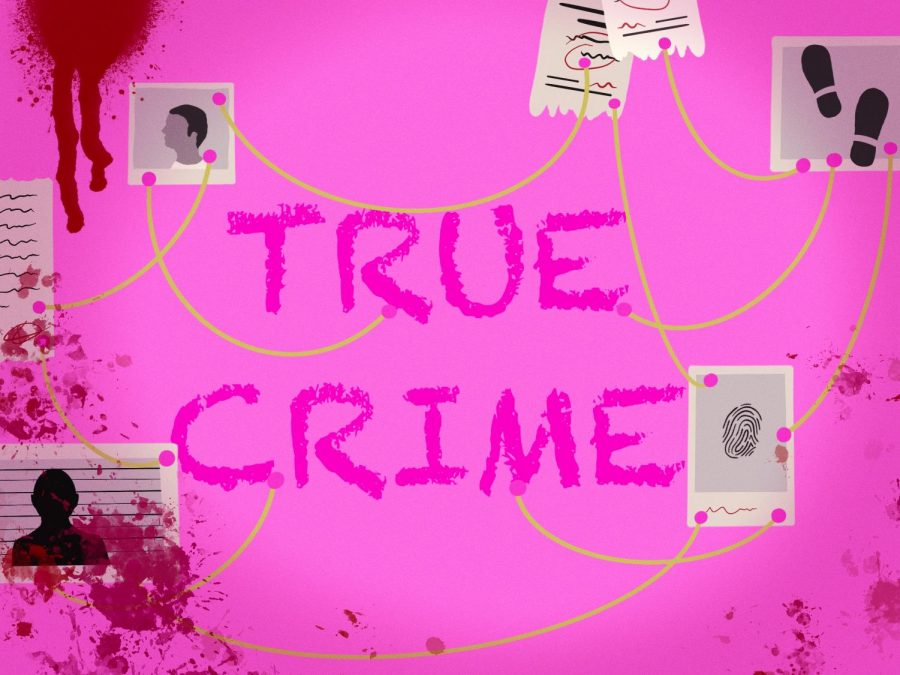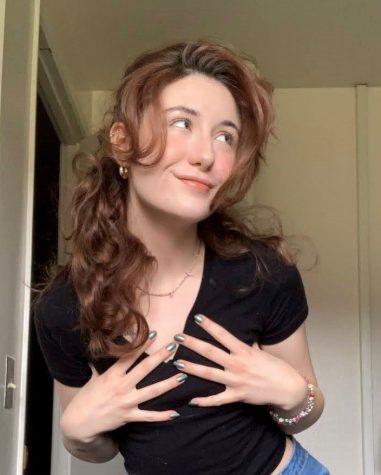Reality check for true crime fans
True crime overly sensationalized, spreads harmful misinformation
Our desire to find the truth in horrific tragedies can actuallu hurt the people involved. True crime fans have to be considerate of who their actions affect.
November 11, 2021
Throughout the last two months, news cycles were dominated by the case of Gabby Petito, a young Instagram travel influencer who went missing in August in the southwest of the United States. The mysterious details of the case — including the role of social media and the involvement of Petito’s boyfriend Brian Laundrie — captivated true crime junkies across the nation.
Countless people, myself included, perused social media relentlessly for days, hungry for updates.
For many, Petito’s disappearance was like a live-action true crime show.
Crime shows have always been popular, but recently true crime has exploded in popularity. True crime podcasts, documentaries, TV shows and biopics have grown into some of the most-consumed pieces of media across services like Netflix and Spotify.
Amaris Cupples, freshman political science major, also heard a lot about the case across various social media platforms, especially early in the investigation.
For fans like Cupples, true crime has all the eerie appeal of a horror movie, with the added intrigue coming from its real-life roots.
“It becomes more of an adrenaline rush with, like, watching and being, like, ‘this could happen to anyone,’” Cupples said.
The true crime community’s interest in Petito, however, quickly exposed many of the problems that lie in true crime consumption and the genre itself.
As the case unfolded in real time, many details quickly became sensationalized. Everyone had a theory they wanted to share and those theories capitalized on the cryptic nature of social media to gain traction.
At one point, for example, social media users were theorizing that Petito had been leaving secret messages in her Instagram posts about her boyfriend being violent. Other followers of the case crafted theories that Petito was involved in something illegal with her boyfriend, and she had disappeared to cover up crimes (I am saying this right here: that is completely untrue).
It is difficult to imagine how Petito’s family and friends must have felt as they watched the entirety of the internet psychoanalyze their daughter and friend when all they wanted was to know she was safe.
Anneka Pawlak, sophomore public relations major, said she would struggle with that if it was her own friend or family member in the news.
“In my experience, the real importance behind a story can get away from people, and I would struggle with seeing my friend or family member be sensationalized or objectified by people who might treat true crime more like a TV show or a hobby,” she said.
The sensationalism and misinformation that true crime fanatics have perpetuated throughout Petito’s case has been inappropriate and harmful to her family and friends at best, and detrimental to actually solving the case at worst.
The public reaction to and involvement with Petito’s ongoing case was not caused by interest in true crime. True crime junkies have been spreading the same sensationalism and misinformation for ages — JonBenet Ramsey, Ted Bundy and the Zodiac Killer are only a few of the cases that come to mind that have been treated in the same manner.
What sets Petito’s case apart is that we have never been able to see it happen so quickly and all live. For that, we can thank the internet and the age of social media.
“There’s always been a certain dynamic that [true crime] reached, but with social media it’s reaching younger groups of people, it’s reaching bigger platforms, and I think that can be kind of problematic sometimes because it reaches people who aren’t really informed on what’s okay and what’s not,” Cupples said.
Seeing everything go down in real time in such a way forced true crime followers to look into a mirror and realize what had been happening all along. Just because a case is older and the people involved are no longer around does not make it any more moral to speculate, sensationalize and spread misinformation.
Petito was a real person, and so was every victim of every famous true crime case that has ever been explored with the same depth. It is exploitative to use their horrible, traumatic deaths or other crimes that were committed against them as entertainment.
Now, this is not to say that all true crime is bad and everyone who consumes it is a monster. I am just as guilty as anyone else of falling victim to the intrigue.
However, it should be consumed conscientiously and it should be produced respectfully.
Just because something happens and people become aware of it does not give anyone the right to speculate, sensationalize, or spread rumors and lies.
Petito was someone’s friend and daughter. She (and every other person involved in famous true crime cases) deserves to be treated and remembered as such.










